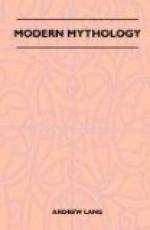All sciences have to act in this way; therefore almost all scientific theories are fluctuating. Nothing here is peculiar to anthropology. A single word, or two or three, will prove or disprove a theory of phonetic laws. Even phonetics are disputable ground.
In defence of my late friend Mr. McLennan, I must point out that if he built a whole social theory on a single statement of Sir George Grey’s, and if Mr. Curr denies the truth of the statement, Mr. Frazer has produced six or seven witnesses to the truth of that very statement in other parts of the world than Australia. {100} To this circumstance we may return.
Mr. Max Muller next produces Mr. Curr’s opinions about the belief in a god and morality among Australians. ’Here he really contradicts himself.’ The disputable evidence about Australian marriage laws is next shown to be disputable. That is precisely why Dr. Tylor is applying to it his unrivalled diligence in accurate examination. We await his results. Finally, the contradictory evidence as to Tasmanian religion is exposed. We have no Codrington or Bleek for Tasmania. The Tasmanians are extinct, and Science should leave the evidence as to their religion out of her accounts. We cannot cross-examine defunct Tasmanians.
From all this it follows that anthropologists must sift and winnow their evidence, like men employed in every other branch of science. And who denies it? What anthropologist of mark accepts as gospel any casual traveller’s tale?
The Test of Recurrences
Even for travellers’ tales we have a use, we can apply to them Dr. Tylor’s ‘Test of Recurrences.’
’If two independent visitors to different countries, say a mediaeval Mahommedan in Tartary and a modern Englishman in Dahomey, or a Jesuit missionary in Brazil and a Wesley an in the Fiji Islands, agree in describing some analogous art, or rite, or myth among the people they have visited, it becomes difficult or impossible to set down such correspondence to accident or wilful fraud. A story by a bushranger in Australia may perhaps be objected to as a mistake or an invention, but did a Methodist minister in Guinea conspire with him to cheat the public by telling the same story there?’
The whole passage should be read: it was anticipated by Professor Millar in his Origin of Rank, and has been restated by myself. {101a} Thus I wrote (in 1887) ’it is to be regretted that Mr. Max Muller entirely omits to mention . . . the corroboration which is derived from the undesigned coincidence of independent testimony.’
In 1891-1892 he still entirely omits to mention, to his Glasgow audience, the strength of his opponents’ case. He would serve us better if he would criticise the test of recurrences, and show us its weak points.




